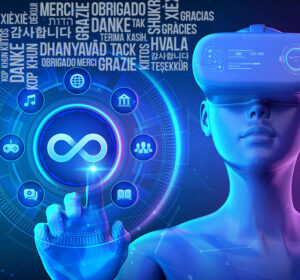

For anyone who has been paying attention to the tech industry and the way experts are talking about the shape of things to come, the idea of the Metaverse is becoming prevalent, and many predict it will be incredibly disruptive to our current markets and the way many of us do business. At the same time, if you are a small business owner, you need to make every effort possible to stay on top of trends in your industry and the habits of shoppers in your target demographics. Success in this space means looking forward and planning so you are in the best position possible to succeed in the foreseeable future.
This article will take a closer look at the Metaverse and the possible future the translation industry faces within it.
What is the Metaverse?
Simply put, the “Metaverse” broadly refers to the increased digitization of our lives and the increasing ability to meaningfully interact with various people, items, and activities in a digital world or an enhanced variation of our world. Blockchain technologies, virtual and augmented realities, and new haptic devices are all beginning to play a role in new interconnected online spaces. Many now look forward to the near future and see only the disruptive effect these changes will bring.
It is hard to argue against the fact that, if current trends continue and many of the technologies in development pan out, significant portions of our lives will be lived in digital spaces.
At its current stage, the definition of what exactly the Metaverse is will depend on who you ask. For some, the Metaverse will be an online variation of our current universe that we will prefer to spend our everyday lives on; they seem to imagine something like the virtual reality universe shown in the movie Ready Player One. For others, the Metaverse is simply just the natural extension of the internet with more sophisticated ways of interacting with the type of content we may already be used to.
Aesthetically, most metaverse initiatives currently appear similar to today’s first-person virtual reality and online video games -though this type of visual display will likely evolve as the Metaverse takes on an identity of its own, wholly independent from online gaming.
Why is Translation Important in the Metaverse?
One of the underlying foundations of the Metaverse is the fact that it involves a great deal of interaction between people in (theoretically) more human ways. If you think of the Metaverse as the natural evolution of the internet, and the internet as the thing that brought the world and our many languages closer together than ever before, it is not hard to see how language and translation will remain incredibly important.
Almost all advancements that help humans to interact more easily will lead to an increase in the need for translation services.
Many theorize that the need for quality translations is likely to increase as companies and creators begin to naturally reach out to the many international audiences they will be intimately connected to through the Metaverse.
It is safe to say however that most casual conversations taking place in the Metaverse will feature some form of instant translation by the AI, something akin to the current version of the translate tool in your browser but in real-time.
Will All Translation in the Metaverse Done by AI and Computers?
Just as today, there will likely be a growing demand for effective on-the-spot translations for everyday conversations between friends. As the technology gets better, it is possible that we will see more content creators and small businesses come to rely on basic AI translation tools.
Likely, some form of instantaneous AI translation will need to be available for most casual conversations in the Metaverse, akin to the current version of the translate tool in your browser but in real-time.
However, this should not be confused with AI taking over as a true translator. Translation is much more than a simple word-for-word replacement and requires a very human touch. Connecting with an audience, especially customers, requires relating to them on a human level with total accuracy. Sounding "fake" can quickly push them away.
AI and Machine Learning, in their current renditions, are typically only really viable for very popular languages (they need large data samples). These systems will take many years to build up the required data to sound natural for rare languages, and if you want to speak with the latest sayings, metaphors, and slang, you will likely be unable to rely on machine learning for many years.
There is also the issue with medical and official translations. Suppose you want to translate legal documents from Spanish into English or vice-versa. In that case, you will still need to get an adequately certified professional Spanish translator as required by the state. The need for human translators is even more dramatic for medical translations, as even the slightest mistake can have fatal consequences.
That said, most day-to-day interactions outside of professional, legal, medical, or official situations may likely be done primarily by machines in the Metaverse.
What Is Metaverse “AI Babelfish”?
A "Babelfish" is a concept coined by Douglas Adams (author of The Hitchhiker's Guide to the Galaxy) and was a sci-fi device capable of instantly translating any language between alien races. Earlier this year, Facebook (or now Meta) announced that they would be trying to create a similar device to support their Metaverse worlds. This is simply the latest rendition of large companies taking on a machine-learning translation challenge.
While the company Meta (Mark Zuckerberg's company) is currently working on its own translation tools using machine learning (mainly for speech-to-speech translations in real-time) the reality is that this technology simply isn't anywhere near ready. As we explained previously, machine learning takes time and large data samples, as well as constant tweaking and even then, it is not suitable for complex topics, nuance, or medical or legal translations.
Google has been working on this same technology for over a decade and they have many more data points to work with, and they are still only working mainly in text-to-text translation. The idea that Facebook (or Meta) will succeed in real-time spoken word translations, at a level above what Google has been able to achieve in written text, is an extremely bold claim and one that is not likely to become a reality for the foreseeable future or without some significant and surprising innovations.
How Will Metaverse Translation Affect the Current Translation Industry? While machine translation tools will never be perfect, they will improve and become incredibly useful. This is not necessarily a bad thing for professional translators. Various sectors of the translation industry may increase and expand along with the enhanced interconnectivity of the human race. While technology will likely continue to replace the need for a translator in casual conversations, we will probably see the translation world transform into one focused almost entirely on high-end legal, medical, and professional services.
What Are Some Opportunities for Translators in the Metaverse?
Gaming Localization
Currently gaming and socializing are the primary activities that are taking place in the Metaverse and will likely remain the primary activities even as more of our world becomes digitized. Within this space there is an endless need for translation services. Not only will the initial games themselves need translations, but all their interactive features will need language support as well. Many of the biggest games of today are highly social and some will even allow players to their own content within the game for other players to interact with. These types of features will only expand translation needs as people wish to share their creations with bigger audiences.
Digital Assets and Cryptocurrency
Unless you've been living under a rock, you're probably sick of hearing about NFTs and other forms of digital assets; however, these technologies are not going away and will slowly become ever more prominent features in our lives. Basically, for the purposes of this conversation, these are markets without geographical borders or limits, and the need for accessible, clear, and professional communications between languages will be something that these markets will steadily increase the demand for.
Virtual Remote Interpreting
Real-time person-operated interpretation is critical and is even helping to save lives all over the world. For example, when someone who doesn't speak the local language needs emergency medical services and goes to the hospital, an on-site interpreter is often the only way they can clearly communicate what is wrong with them. The Metaverse will soon allow these services to be pushed even further, and interpreters will be well-placed to become digital liaisons between businesses or medical centers and those seeking to communicate with them.
AR Translation
Augmented reality is another aspect of Metaverse technologies that we haven't really touched on, but anyone who has taken a look at Google Glasses or played Pokémon Snap should be familiar with it. This is an overlay of digital assets onto the everyday world that can be experienced through special glasses or digital devices. Very soon, we will be seeing things like a pair of glasses that can help travelers read local street signs. Exactly how this will manifest is uncertain, but many organizations and locations will likely need a translator to ensure they are being correctly represented across the spectrum of languages in the AR space.
The Future is Coming Whether We are Ready or Not
While we don't know the exact nature or shape of things to come, we do know that something is new coming. When you look at the technology around us and how it is advancing, as well as the evolution taking place in so many industries as they digitize and go online, it is not hard to see that big changes are happening.
For small businesses, the sooner you can make your content and deliverables multilingual, and the more comfortable you become with that process in general, the more prepared you will be for the next step in human interconnectivity and the easier it will be for you to attract new customers in these new spaces.
At The Spanish Group, we are dedicated to providing fast and accurate translations at the best prices possible (in over 90 languages!). We do not plan to stop offering this even as we start living as AI avatars. If you are ready to take your business online and effectively communicate with the world, we are prepared to help in any way possible.
















